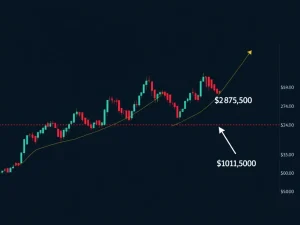Crackdown Catalyst: South Korean Crypto Market’s Surprising Resilience in 2025

Buckle up, crypto enthusiasts! South Korea’s digital asset scene has been nothing short of a rollercoaster in early 2025. Imagine a plot twist worthy of a K-drama: a political storm followed by a regulatory tempest. Just as the dust settled from an attempted presidential power grab, financial watchdogs emerged, laser-focused on the burgeoning cryptocurrency market. Let’s dive deep into the whirlwind of events that have reshaped the landscape of South Korean crypto in the first quarter of 2025.
South Korean Crypto Regulation Takes Center Stage After Political Earthquake
South Korea entered 2025 amidst political turmoil sparked by former President Yoon Suk Yeol’s controversial martial law declaration in December 2024. This unexpected event threw the nation into chaos and significantly impacted the financial markets, including the crypto sector. In the aftermath, while the political landscape stabilized, financial regulators wasted no time in turning their attention to cryptocurrencies. The first quarter of the year became a period of intense scrutiny and decisive action, setting the tone for crypto regulation in South Korea moving forward. This period saw a flurry of investigations into crypto exchanges and a re-evaluation of corporate participation in the digital asset market.
Crypto Tax Exemption: A Temporary Reprieve for South Korean Investors
In a move that offered a sigh of relief to many, the planned 20% capital gains tax on crypto assets was postponed yet again. Initially slated for 2022, then pushed to 2023, and subsequently to 2025, the tax implementation is now delayed until 2027. This marks the third time lawmakers have opted to postpone the crypto tax, citing persistent economic uncertainties and the recent political upheaval.
Key reasons behind this continued delay include:
- Fear of Investor Exodus: Concerns remain that imposing taxes could drive crypto investors to offshore exchanges with less stringent tax regimes.
- Challenges in Tracking Wallet-Based Profits: Regulators acknowledge the complexities of accurately tracking and taxing profits from decentralized wallets.
- Shifting National Priorities: The failed martial law incident and subsequent impeachment proceedings shifted the government’s focus, leading to a reconsideration of immediate financial policies.
While this delay provides short-term relief, it also signals ongoing uncertainty about the long-term tax framework for crypto in South Korea.
Corporate Crypto Accounts: A Phased Rollout for Institutional Participation
After much anticipation, South Korea’s Financial Services Commission (FSC) finally unveiled its phased plan to permit corporate crypto accounts. This decision marks a significant step towards institutionalizing crypto trading within the nation. The rollout, expected to be gradual through late 2025, will require businesses to operate under “real-name” accounts and strictly adhere to Know Your Customer (KYC) and Anti-Money Laundering (AML) regulations.
The initial phase prioritizes:
- Charities and Universities: These entities will be the first to gain access, primarily to facilitate the liquidation of crypto donations starting in the first half of the year.
This move aims to formalize institutional participation in the crypto market while maintaining robust compliance standards. The “real-name” system, a long-standing financial practice in South Korea, is central to preventing tax evasion and money laundering. Previously, the absence of a clear regulatory framework for corporate accounts effectively barred both domestic companies and overseas users from trading on South Korean exchanges. This new roadmap seeks to rectify this, paving the way for broader institutional involvement under a more controlled environment.
Navigating Market Manipulation: Upbit and Others Face Regulatory Scrutiny
Enforcement actions against market manipulation intensified in Q1 2025. South Korean authorities indicted a trader for pump-and-dump schemes, marking the first prosecution under the Virtual Asset User Protection Act. This new law, effective from July 2024, underscores the government’s commitment to clamping down on illicit activities within the crypto space.
Upbit, South Korea’s leading crypto exchange, faced significant headwinds during this period. The exchange received a suspension notice for alleged KYC violations affecting over 500,000 instances. Regulators even considered a ban on new user registrations as a consequence. Adding to Upbit’s woes, both Upbit and Bithumb, another major exchange, had to compensate users for service outages stemming from the December 2024 martial law declaration. The sudden announcement triggered panic and trading surges, overwhelming platform infrastructure.
Furthermore, Upbit’s operator, Dunamu, received formal sanctions from the Financial Intelligence Unit (FIU) for KYC compliance failures and dealings with unregistered foreign exchanges. This resulted in a partial business suspension, restricting new customer deposits and withdrawals for three months. Dunamu has since filed a lawsuit to challenge these sanctions, highlighting the ongoing tensions between regulators and exchanges.
The Rise of Crypto Crime Enforcement and the Bitcoin ETF Question
South Korea formalized its commitment to combating crypto crime by officially launching the Virtual Asset Crime Joint Investigation Division. This 30-person task force, comprising prosecutors, regulators, and specialists, had already made significant strides as a temporary unit, indicting 74 individuals and recovering substantial illicit gains. The formalization signals a sustained and aggressive approach to tackling illegal activities in the crypto sector.
In a surprising turn, the FSC began reconsidering its stance on Bitcoin (BTC) spot exchange-traded funds (ETFs). Drawing inspiration from Japan’s evolving regulatory landscape, South Korean regulators are now exploring legal pathways to potentially allow Bitcoin ETF products. This represents a notable shift from previous opposition, driven by growing client demand and the successful launch of spot Bitcoin ETFs in the United States. While regulatory review is still in its early stages, the fact that it’s being considered at all marks a significant development for the South Korean crypto market.
Crackdown on Unregistered Exchanges and the Path Ahead
The FIU initiated a crackdown on unregistered foreign crypto exchanges, compiling a list of illegal platforms and moving to block access through app stores and internet service providers. Google Play removed 17 such apps, including prominent exchanges like KuCoin and MEXC, at the request of regulators. Apple followed suit, further tightening the noose on unauthorized platforms. The FIU has warned of criminal penalties for platforms operating without proper licensing.
Despite the regulatory headwinds, South Korea’s crypto adoption continues to surge. Over 16 million citizens, roughly a third of the population, now hold crypto accounts, surpassing the number of stock traders. However, trading volumes have cooled, indicating a maturing market. As South Korea heads towards an early presidential election in June, crypto is expected to be a key campaign issue. One candidate has already pledged to overhaul crypto regulations, mirroring a pro-industry approach.
Key Takeaways: South Korean Crypto in Q1 2025
- Regulatory Crackdown: Increased scrutiny and enforcement actions are shaping the market.
- Tax Uncertainty: Continued delays in crypto tax implementation create both relief and uncertainty.
- Institutionalization: Phased rollout of corporate accounts opens doors for institutional investors under stricter compliance.
- Market Maturation: Adoption is high, but trading volumes are moderating, signaling a shift towards a more mature market.
- Bitcoin ETF Potential: Regulatory reconsideration of Bitcoin ETFs could be a game-changer.
South Korea’s crypto market is at a pivotal juncture. The initial crackdown phase of Q1 2025 is paving the way for a more regulated and potentially more institutionalized future. As the nation moves towards elections and further regulatory developments, the global crypto community will be watching closely to see how this dynamic market evolves. Will the crackdown be a catalyst for sustainable growth and innovation, or will it stifle the vibrant South Korean crypto scene? Only time will tell, but one thing is clear: South Korea remains a crucial player in the global crypto narrative.









